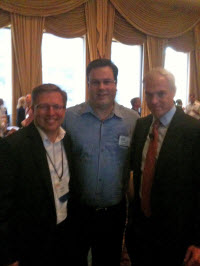 Two business thought leaders that I highly recommend are Verne Harnish and Jim Collins.
Two business thought leaders that I highly recommend are Verne Harnish and Jim Collins.
They both wrote books I love. Verne' "Rockefeller Habits" is terrific. And Jim's "Good to Great" and "Built to Last" are both classics.
Recently, I heard Jim Collins talk about his new book, "How the Mighty Fall – And Why Some Companies Never Give In". It's a quick read makes a lot of sense.
Before I talk about the book, here are three things he said that caught my attention. Even out of context they are worth repeating:
- It's better to be interested, than to be interesting.
- Don't worry about survival or success; instead, wrestle with how to be useful.
- Great leaders don't always know the answers … they are, however, great at knowing great questions.
The Point of the Book: Keep-Up the Disciplines that Make You Great.
One of the key points was to be terrified of your success. Not because success is bad, in-and-of-itself. Rather, because success often takes you away from the disciplines of building greatness.
The difference between good and great is often a culture of discipline and a focus on having the right people filling the key seats in the company.
It is One Thing to Have the Right People On the Bus … How Well Are Your "Key Seats" Filled?
How many "Key Seats" are there in your company? Perhaps more importantly, ask yourself what percent of these Key Seats do you have empirical proof, and confidence, that the right people are already in-place, doing the right job? Then, ask yourself whether the percentage is increasing, decreasing, or holding steady?
If this is important to your company … what are you going to do about it? And how often are you going to focus on this?
Most Companies Measure and Manage the Wrong Things.
Another point he stressed was that what gets measured, gets managed. However, one of the disciplines of greatness is to get beyond measuring what's easy, to define what needs measurement and management. Recognizing the key performance indicators in the key measures of success go a long way towards moving in the right direction, together, as a company.
Agree to A Committed Action.
He reminds that great companies are not without disagreement. Instead, they use it as a catalyst to see issues from different perspectives, to get tough conversations out into the open, and then commit to a course of action. Not everyone has to agree with the course of action; yet, everyone should have clarity about what they are agreeing to and what course of action will be.
"How the Mighty Fall – And Why Some Companies Never Give In"?

One of the main points of his new book is the downturns are predictable and to some extent, inevitable; however, it doesn't have to be fatal. In fact, it can be the catalyst to the next round of growth on the path to greatness.
He asks the question: "Why do truly great companies limit growth and set absolute minimum standards, which must be exceeded?" Here is a high-level view of the answer.
- It ultimately comes down to rigorous strategic thinking.
- It means knowing what you do, and doing it well.
- It means having an important stretch goal, and pursuing it in a disciplined manner.
- And it means doing all this with the right people, doing the right jobs, and great management.
Bottom Line: Stay disciplined … and keep the Main Thing, the main thing.
